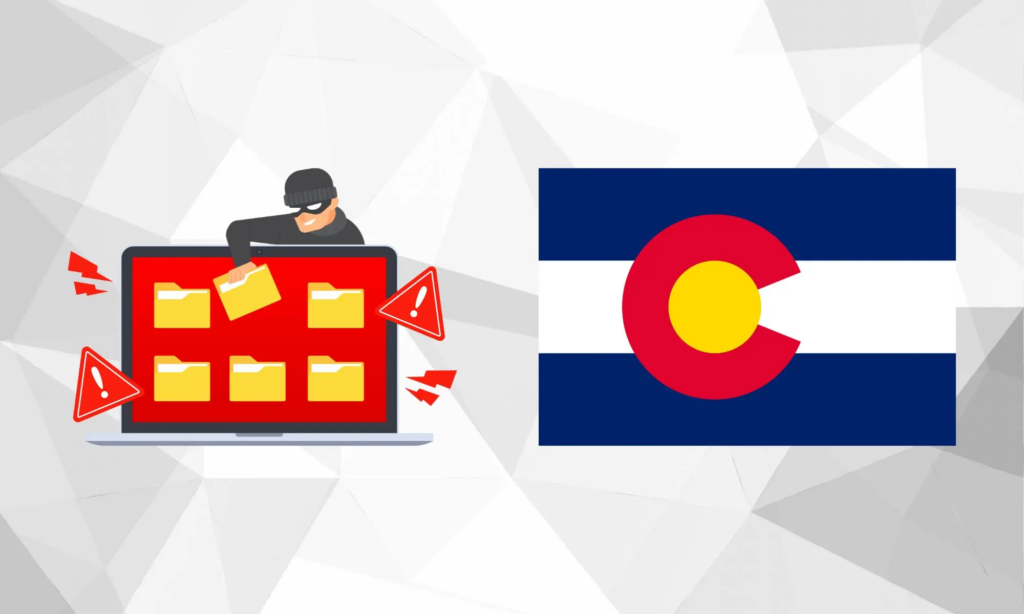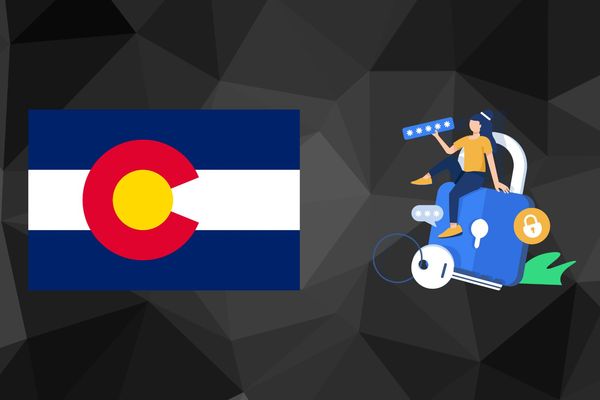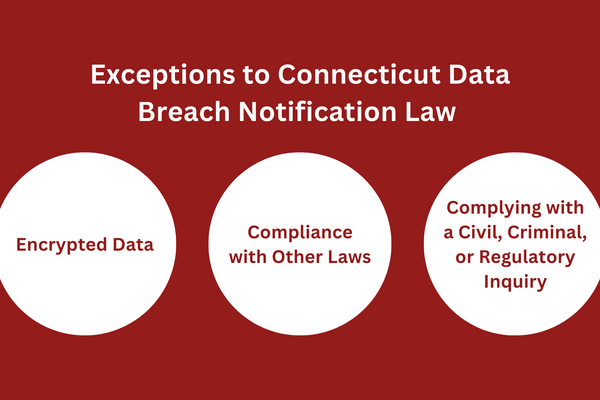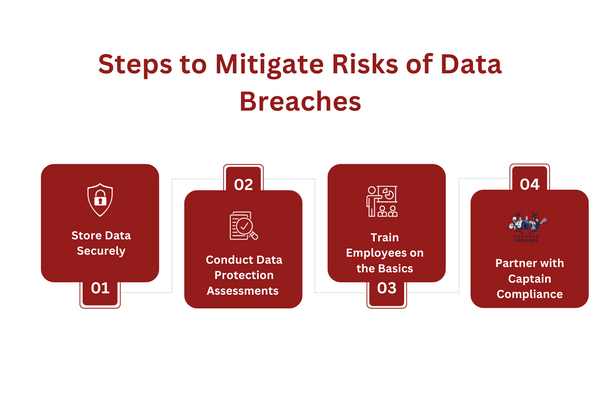
If your business faces a data breach, don’t worry. This article will show you simple steps to handle a Colorado Privacy Act breach.
We’ll talk about what you need to do right away, how to stop this from happening again, and why knowing the Colorado Privacy Act rules is key.
If you’re a medium to large business with Colorado consumers, and you’ve experienced a data breach, or you want to know what you should do for a data breach, stay tuned.
Key Takeaways
The new privacy rules in Colorado, much like the GDPR, are super important for protecting our personal details and ensuring data protection. They make businesses handle consumers’ private information carefully and empower consumers with certain rights to control their own data.
When businesses have a data breach, the law says they must act fast. They need to notify folks and the right people right away, or they may be subject to large fines and other penalties.
Captain Compliance offers comprehensive compliance services to help businesses stay on the right side of these privacy laws. We provide outsourced compliance and compliance training to walk you through all the Colorado rules so you don’t slip up and get in trouble.
What is the Colorado Privacy Act?
What is the Colorado Privacy Act.jpg

The Colorado Privacy Act, or CPA, is a new law about protecting people’s personal data that became effective on July 1, 2023. It was created for businesses to keep people’s private data safe and secure, as well as to respect data subject rights.
The law says businesses have to be clear and transparent about how they use and collect personal data and give regular people more control over their own information.
The CPA came about because residents were worried about how their personal info was being used all over the place. We all put stuff out there online nowadays – names, addresses, phone numbers, and even sensitive data.
This law, in the spirit of similar state privacy, like the CCPA, ensures businesses are careful with that kind of data and adhere to strict data protection and corporate compliance rules.
Now, businesses have to tell consumers what they’re going to do with their information if they want to collect it. They also need to keep the data safe and not share it with organizations without asking. And, when a breach happens, the consumers have to know about it, too.
It gives people some rights, too. They can ask to see their information or have it deleted if they want. They can say no way to their data being sold. And if they think something sketchy’s going on, they can ask the business to fix it.
Important Definitions
Before diving into the details of the Colorado Privacy Act, it’s essential to understand some key terms. These definitions will help businesses grasp the core concepts of data privacy and protection.
Data Breach
A data breach is when someone gets unauthorized access to data. This can happen through hacking, lost devices, or mistakes. It’s like if someone breaks into a house and takes things that don’t belong to them.
A data breach typically means that personal information or sensitive personal information got into the wrong hands and under most data privacy laws (including the CPA), it requires businesses to notify affected consumers and in some cases, the authorities.
Personal Information
Personal information is any detail that can identify a person. This includes names, addresses, and more sensitive stuff like social security numbers or credit card details. It’s the kind of information that, if stolen, could be used in the wrong way.
Notification
Notification is the process of telling people that their personal information might have been taken in a data breach. It’s like if someone’s wallet was stolen, and they needed to tell their bank and cancel their cards.
Sensitive Personal Information
Sensitive personal information is extra private data that could cause a lot of harm if used in the wrong way. It’s not just someone’s name or email but things like health information, social security numbers, or financial information. It’s the kind of stuff that could cause a lot of harm if it got into the wrong hands.
Identity Theft Protection
Identity theft protection involves services or actions that help keep personal information safe. It’s like having a guard who watches over your personal details to keep them out of reach from thieves.
If a consumer’s sensitive data was leaked that could cause identity theft, it’s best practice to provide identity theft protection services to the affected consumers.
Colorado Privacy Act Breach Notification Time Limits
When a business in Colorado finds out that consumers’ personal data might’ve been stolen or seen by someone who wasn’t supposed to, there are clear rules about letting people know.
First things first, businesses must check quickly to see if the data was really taken (or if there’s reasonable suspicion that the data was taken), and if it was, you must tell the people whose data got taken. The law says businesses have 30 days from when they find out about the breach to give consumers affected a notification.
But it isn’t just the people that need to know. If it’s a big breach and over 500 Colorado people get caught up in it, the business must tell the Colorado Attorney General, too. That’s the state’s top lawyer who makes sure laws are followed, and again, they only have 30 days to do it.
For larger scale leaks, where over 1000 people’s personal data is at risk, the business also must tell the credit bureaus. These include Transunion, Equifax, and Experian.
So, the clock starts ticking as soon as a business knows something happened with consumers’ personal data. The key is to act fast without unreasonable delay and follow the rules so everyone can do what they can to protect themselves.
Colorado Privacy Act Breach Requirements
In Colorado, when personal information is exposed in a data breach, businesses must follow specific steps to notify those affected. This isn’t just about fixing the breach; it’s about clear communication and taking responsibility.
What to Include in the Notification
The notice about the data breach should lay it all out clearly so people know what’s up. It must say when it happened, or at least give a rough timeline if they don’t know for sure. Additionally, it should cover what kind of personal data got taken – like emails, credit cards, and anything else.
Give the business contact info in case anyone’s gotta get in touch to find out more, and it should tip folks off on stuff they can do to watch their back, like put fraud alerts on their credit or freeze it up tight.
Who Should Be Notified
Businesses need to let the affected people in Colorado know right away if their information gets stolen or leaked. If it happens to 500+ residents, the Colorado Attorney General also has to know within 30 days.
Additionally, for breaches affecting more than 1,000 residents, credit reporting agencies must be informed, as stated in the Colorado Attorney General’s Security Breach Notification Guidance.
How to Notify
The law says you can notify people in writing, on the phone, or electronically over email or messages.****
If telling each person directly is too hard because there are so many people or it costs too much, you can substitute notice instead.
To meet the requirement for a substitute notice, the data breach must:
Exceed $250,000 in costs
The number of residents exceeds 250,000
You don’t have sufficient contact information
For substitute notice, you can email the affected people or post it on your website and put it in statewide media, as described in the Colorado Attorney General’s Data Protection Laws.
Exceptions to Connecticut Data Breach Notification Law
Exceptions to Connecticut Data Breach Notification Law .png

There are certain situations where businesses might not have to tell consumers about a data breach. Here are a few of the exceptions to consider:
Encrypted Data
If the personal information that was accessed is encrypted, and the encryption key wasn’t also taken, then a business might not need to notify consumers.
Encryption is like a secret code that makes sure data is kept safe, and without the key, the information is unreadable and thus, no personal information was leaked.
Compliance with Other Laws
Colorado’s new privacy law has consumers scratching their heads. Some businesses already follow strict federal rules about handling personal data. Health businesses deal with HIPAA, protecting consumers’ health history, and banks have the GLBA, guarding consumers’ financial data.
Since these businesses are covered by other laws that are just as strict or stricter than the Colorado Privacy Act, these businesses are exempt from the CPA.
This doesn’t necessarily mean you will be exempt from notifying a data breach, but rather, this data is not covered by the CPA and is subject to other laws like the HIPAA or GLBA.
Complying with a Civil, Criminal, or Regulatory Inquiry
There are times when a data breach might be part of a legal investigation. If telling consumers about the breach would mess with that investigation, a business can hold off on notification until it’s okay to do so without causing issues for the authorities.
Steps to Mitigate Risks of Data Breaches
Steps to Mitigate Risks of Data Breaches.png

Data breaches can be a big headache for businesses, but there are ways to make them less likely. Here’s how you can keep your business’s data safe:
Store Data Securely
It’s really important to keep your sensitive information secure. Think of it like a treasure that you must protect. Don’t just leave it out in the open where anyone can get it. Use tough passwords that’ll be hard to figure out, and keep the passwords somewhere private where people can’t see them.
Only let certain people get access to the data. These should be people you trust a whole lot. It’s kind of like how only certain employees get the key to the safe.
You can use software that basically builds a huge fence around your data – that’s called a firewall. It blocks out people who should not be poking around in there.
You also need good locks, which in tech talk means encryption. This protects data if someone is sending or receiving it, and you must keep assessing your security, like making sure your guards are staying alert.
Last thing – keep your software updated. Hackers love old, outdated software because it’s easier for them to hack. So updating keeps you a step ahead of the bad guys.
Conduct Data Protection Assessments Frequently
Analyzing your data security measures on a regular basis is incredibly important. This will help you identify any potential weaknesses or vulnerabilities so that they can be addressed immediately.
It’s also recommended to seek external expertise for this, in the form of cybersecurity specialists who have extensive knowledge and experience in protecting against cyber threats.
Train Employees on the Basics
Employees are often the first line of defense when it comes to preventing data breaches. Therefore, they need proper training on understanding and following privacy rules as well as recognizing cybersecurity threats like phishing attempts or suspicious emails. Employees should also know how to respond if they suspect a breach has occurred.
You can hire an external compliance service like Captain Compliance to conduct the training or do this in-house.
Partner with Captain Compliance
Partnering with Captain Compliance is an excellent strategy to ensure your company’s data remains safeguarded and complies fully, not only with the Colorado Privacy Act but also with all other prevalent privacy regulations.
We are a trusted service provider that specializes in reinforcing security measures, reducing the risk of breaches, ensuring statutory compliance, protecting clients’ reputations and avoiding hefty penalties for non-compliance.
Our team at Captain Compliance consists of industry professionals who have extensive knowledge of cybersecurity compliance laws.
We dedicate our time familiarizing ourselves with changes and updates made on these laws regularly to create strong defenses for our client’s valuable data across various business functions.
Penalties for Non-Compliance with the Colorado Privacy Act
When a business does not comply with the CPA, several consequences can arise, which are designed to ensure that businesses take the protection of personal information seriously.
Legal Consequences: If a business fails to notify the affected Colorado residents or the Attorney General when required, it may face legal action from the state. This could lead to court orders demanding payment to consumers. The consumers also have the right to take legal action against your business.
Fines: Non-compliance can result in monetary penalties of $2,000 to $20,000 per violation and $500,000 as a maximum fine. These fines are often calculated based on the severity and duration of the breach, as well as the number of residents affected.
Reputational Damage: Beyond legal and financial repercussions, businesses that fail to comply with the CPA may suffer reputational harm, which can impact consumer trust and the bottom line.
Closing
You’ve been learning all about this new Colorado Privacy Act thing and what it means for your business. At this point, you’re wondering, okay, got it. But what am I actually supposed to do now?
Well, that’s where we come in! Here at Captain Compliance, we want to be your guide through the data privacy world. We can help make sure your business follows all the rules and regulations of the CPA so you can focus on running your business and leave the complex compliance tasks to us.
If any of this has you feeling overwhelmed or unsure, get in touch with us. We offer compliance services, training programs, and support to keep businesses like yours on the right track. With us by your side, you can feel confident knowing your business is in compliant hands.
FAQs
What is a Colorado Privacy Act Breach?
A Colorado Privacy Act breach happens when someone sees or takes personal info they shouldn’t have. It’s like someone peeked at your secret diary or took it without asking.
Need help notifying a potential breach? We have an article guiding you through how to notify affected consumers according to the GDPR!
Who needs to know if there’s a breach?
If personal info gets out, businesses must tell the people whose data got breached, and sometimes the big shots like the Colorado Attorney General (500+ people) or credit bureaus (1,000+ people), depending on how big the breach is.
Confused about who to notify? Reach out to Captain Compliance, and we’ll make it clear to you!
What should I do if there is a breach in my business?
Act quickly! Check what information has been taken, notify the right people quickly, and take steps to prevent the breach from happening again.
If you need more information, take a look at our education section here.